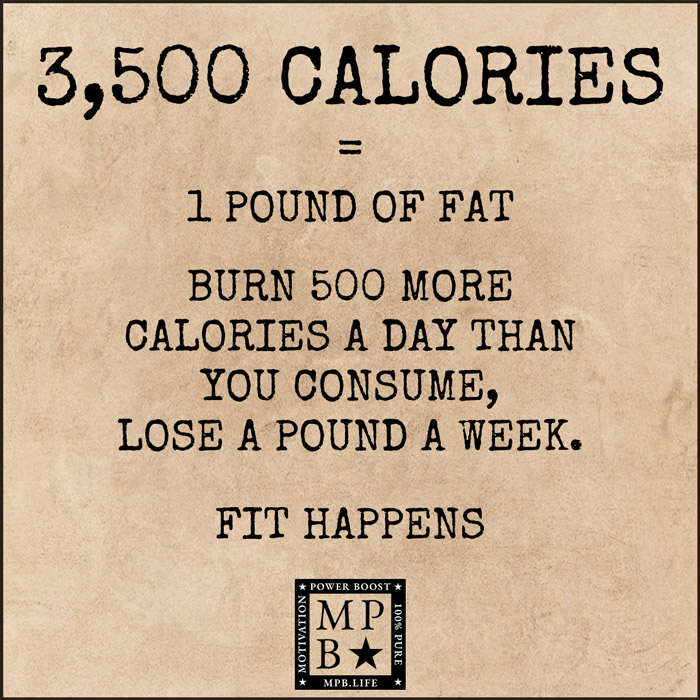
3500 Calories Graphic © motivationpowerboost.com
3,500 CALORIES
=
1 POUND OF FAT
BURN 500 MORE CALORIES A DAY THAN
YOU CONSUME, LOSE A POUND A WEEK.
FIT HAPPENS
The Simple Math for Sustainable Weight Loss Success
For anyone who has struggled with weight loss, you’ve likely been bombarded with all sorts of complicated diet rules, rigid exercise regimens, and expensive supplements promising to be the magic bullet.
But at its core, sustainable and healthy weight loss comes down to some simple arithmetic: calories in versus calories out. And this straightforward quote lays out those numbers in a way that’s easy to understand and act on:
“3,500 calories = 1 pound of fat. Burn 500 more calories a day than you consume, lose a pound a week. Fit happens.”
When you break it down, achieving a calorie deficit of 500 per day sets you up to lose one pound of fat per week through diet and exercise adjustments. That’s meaningful, realistic progress without having to resort to extremes or quick-fix fads.
The best part? This formula can be followed safely and indefinitely until you reach your goals. No crash diets, no rapid, unsustainable weight drops—just simple, step-by-step body recomposition through patience and commitment.
Here’s why a 500 daily calorie deficit is powerful:
It’s achievable through small, lasting lifestyle adjustments.
Cutting just 300-400 calories through smarter nutrition choices like meal prep, less alcohol, controlling portions etc. Then burning an extra 100-300 calories through daily walks, hikes, swims, playing sports, lifting weights or other enjoyable activities gets you there.
It allows you to still eat foods you love.
At a 500 calorie daily deficit, you can absolutely still incorporate your favorite meals and snacks in moderation and sensible portions. No deprivation or cutting out entire food groups is necessary.
It protects your metabolism.
Losing 1-2 pounds per week through a 500 calorie daily deficit is considered a safe, reasonable rate of loss that shouldn’t tank your metabolism like extreme calorie slashing can. Your body will continue burning at an normal rate.
It builds sustainable habits for the long haul.
Adopting the mindset of a modest calorie deficit through balanced nutrition and regular physical activity is a lifestyle, not a quick fix. It sets you up for lasting lifestyle habits for maintenance after reaching your goal weight.
Sure, the scale may not move as rapidly as you’d like some weeks. But visualize the consistent progress of chipping away at one pound per week over months and years. Those lbs melt away into transformative, permanent results when you stay diligent.
There’s no need to overcomplicate weight loss with strict rules and restrictions. Simply invest in establishing small habitual calorie deficits through the simple choices you make day-to-day, and the progress will follow physics. “FIT HAPPENS,” as the quote declares.
Little by little, step by step, pound by pound—mastering simple calorie deficits allows you to lose weight for good, while still living your life. After all, the best weight loss is the kind done through sustainability and patience, not perfection or deprivation. Let those basic numbers guide you towards lasting success.
Mastering the Mindset: Overcoming Psychological Hurdles
While the math behind sustainable weight loss through calorie deficits is straightforward, implementing it consistently can be a psychological challenge. Our minds often resist change, sabotaging our efforts with self-doubt, cravings, and justifications for old habits. Mastering the mindset is crucial for long-term success.
One effective approach is to reframe your perspective on weight loss. Instead of viewing it as a temporary diet or deprivation, embrace it as a lifestyle shift towards prioritizing your health and well-being. Celebrate the small victories, such as making better food choices or increasing physical activity, rather than obsessing over the number on the scale.
Additionally, it’s essential to identify and address the emotional triggers that lead to overeating or sedentary behavior. Many individuals turn to food for comfort, stress relief, or as a reward. By developing healthier coping mechanisms, such as mindfulness practices, journaling, or seeking support from loved ones, you can break the cycle of emotional eating.
Another critical aspect is cultivating patience and self-compassion. Weight loss is a journey, not a sprint, and setbacks are inevitable. Rather than berating yourself for slip-ups, adopt a growth mindset and view them as opportunities to learn and adjust your approach. Celebrate your progress, no matter how incremental, and remember that consistency over time is the key to lasting success.
Surrounding yourself with a supportive community can also provide invaluable motivation and accountability. Whether it’s joining a local fitness group, engaging with online forums, or enlisting the help of a qualified nutritionist or personal trainer, having a network of like-minded individuals can help you stay on track and overcome obstacles.
By mastering the mindset and addressing the psychological barriers, you can transform the simple math of calorie deficits into a sustainable lifestyle change. With patience, self-compassion, and a commitment to personal growth, you’ll not only achieve your weight loss goals but also cultivate a healthier, more fulfilling relationship with food and your body.
Related Inspirational Quotes
“Eat less, move more.” – Alessandra Ambrosio
“Take care of your body. It’s the only place you have to live.” – Jim Rohn
“Exercise should be regarded as a tribute to the heart.” – Gene Tunney
“The reason I exercise is for the quality of life I enjoy.” – Kenneth H. Cooper
“If it doesn’t challenge you, it won’t change you.” – Fred DeVito
